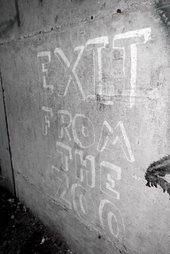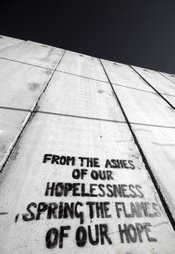Sterile Ethnic Cleansing
The dim light fed into the Jaffa tent. Light, the shape of diamonds, vaguely illuminated the space. The couch and cushions were comfortable. They were red—black lines decorated the surface. The place was filled with a relaxing smoke. Troubles were far away, except for the troubles of the mind. Like the smoke that lingered in our tent, troubling thoughts filled my mind.
These weeks and these days have been different—they have been new indeed. These days have been refreshing and exhausting.
I remember sitting in a small simple shop called Sultan where they serve tea, coffee, and Argeela. We all sat in silence, thinking perhaps, or simply enjoying each other’s company. After telling some childhood stories to one another, Mohammed shared his favorite childhood memory. He remembers walking through the fruit tree fields in his village. It was a joy to harvest the apricots. He liked sitting in the shade of the apricot trees sipping tea with mint leaves and talking with his father. They each would taste-test a number of apricots just to make sure they were alright. Mohammed is the leader in his village now.
I thought this was the most appropriate memory for the existing situation here. The land where these trees once stood has now been flattened. The trees uprooted. More land, more trees, more fruit is disappearing. Memories, though seemingly existing only in the mind, will never be repeated in these fields.
It is sad.
But there are hundreds of people protesting this loss of land, loss of memory, loss of life. The loss seems inevitable. But the enthusiasm, commitment, and energy put into protecting this livelihood points to something amazing, powerful, and victorious. We are on the verge of seeing a something courageous, something astounding.
Walking through the bulldozed, treeless land was strange, it felt bare and wrong. This land is supposed to have trees. The trees are supposed to be giving fruit by now. The people are supposed to be able to harvest this fruit. This valley, this land is not supposed to be a sewage dump.
_________________
Land confiscation is a very common occurrence in Palestine. This refers to land within the pre-June 1967 Green Line. The “Green Line” is an international recognized border that separates Israel proper from the West Bank (Palestine). Land within the West Bank is regularly confiscated for settlement expansion, water rights, and “security.” The place described above is a village called Artas in a fertile valley near Bethlehem. Like so many other places in the West Bank, the land being confiscated in Artas will serve the expansion of a nearby settlement called Efrata. (According to international law, the settlements within the West Bank are illegal—certainly settlement expansion.) The land that is being taken (from the story above) is going to be used as a sewage dump for Efrata. Artas valley, as mentioned, is extremely fertile. Thousands of poor farmers depend on its soil for their livelihood. Now this valley is being turned into a sewage dump, which according to those who have crunched the numbers, will most likely spill over soon after construction and destroy the entire Artas valley, disenfranchising thousands of farmers and rendering life in Artas unlivable. Artas is a characteristic example of the type of intimidation, illegal expansion, and all out ethnic cleansing that Israel has routinely been engaged in the occupied Palestinian territories (West Bank and Gaza). While in Artas and many other cases Israel does not explicitly or forcefully expel the local Palestinian population, they, through a vast complex of apartheid-esque tactics that make normal life unsustainable.


1 comment:
Very well said. You don't need to force everyone to leave when it's easier still just to make it so no one wants to stay. Or can stay. Or those that do stay can only wind up suffocating. It's great to see the reconciling power of the human spirit though. I would love to see those beautiful memories in those bountiful fields repeating one day for future Mohammed's.
I read an article (related?) a day or so ago saying that Hagihon, the company who handles the sewage and water for settlements around Jerusalem was going public/privatized. I wonder if that effects, or will effect, issues like what's happening here...
Post a Comment